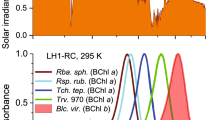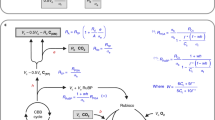Abstract
EVIDENCE was presented (B. Lewis and E. K. Rideal, J. Chem. Soc., 129, 583 and 596; 1926) for the view that the photo-expansion of bromine and other halogens in the presence of water vapour (Budde effect) is due to heat liberated by the recombination of halogen atoms set free by the absorption of light quanta. Although absorption of radiation occurs in the dry gas, no Budde effect is observable (J. W. Mellor, J. Chem. Soc., 81, 1280; 1902; Lewis and Rideal, loc. cit.) even when the gas is subjected to an intense source of ultra-violet radiation (E. B. Ludlam, Proc. Roy. Soc. Edinburgh. 44, 197; 1924). This is interpreted to mean that the halogen does not dissociate in the dry state; that the radiation absorbed activates the halogen molecule for a short period of time and is then emitted (presumably as longer wavelengths).
This is a preview of subscription content, access via your institution
Access options
Subscribe to this journal
Receive 51 print issues and online access
$199.00 per year
only $3.90 per issue
Buy this article
- Purchase on Springer Link
- Instant access to full article PDF
Prices may be subject to local taxes which are calculated during checkout
Similar content being viewed by others
Author information
Authors and Affiliations
Rights and permissions
About this article
Cite this article
LEWIS, B. The Function of Water Vapour in the Photosynthesis of Hydrogen Chloride. Nature 120, 473–474 (1927). https://doi.org/10.1038/120473b0
Issue Date:
DOI: https://doi.org/10.1038/120473b0
Comments
By submitting a comment you agree to abide by our Terms and Community Guidelines. If you find something abusive or that does not comply with our terms or guidelines please flag it as inappropriate.



